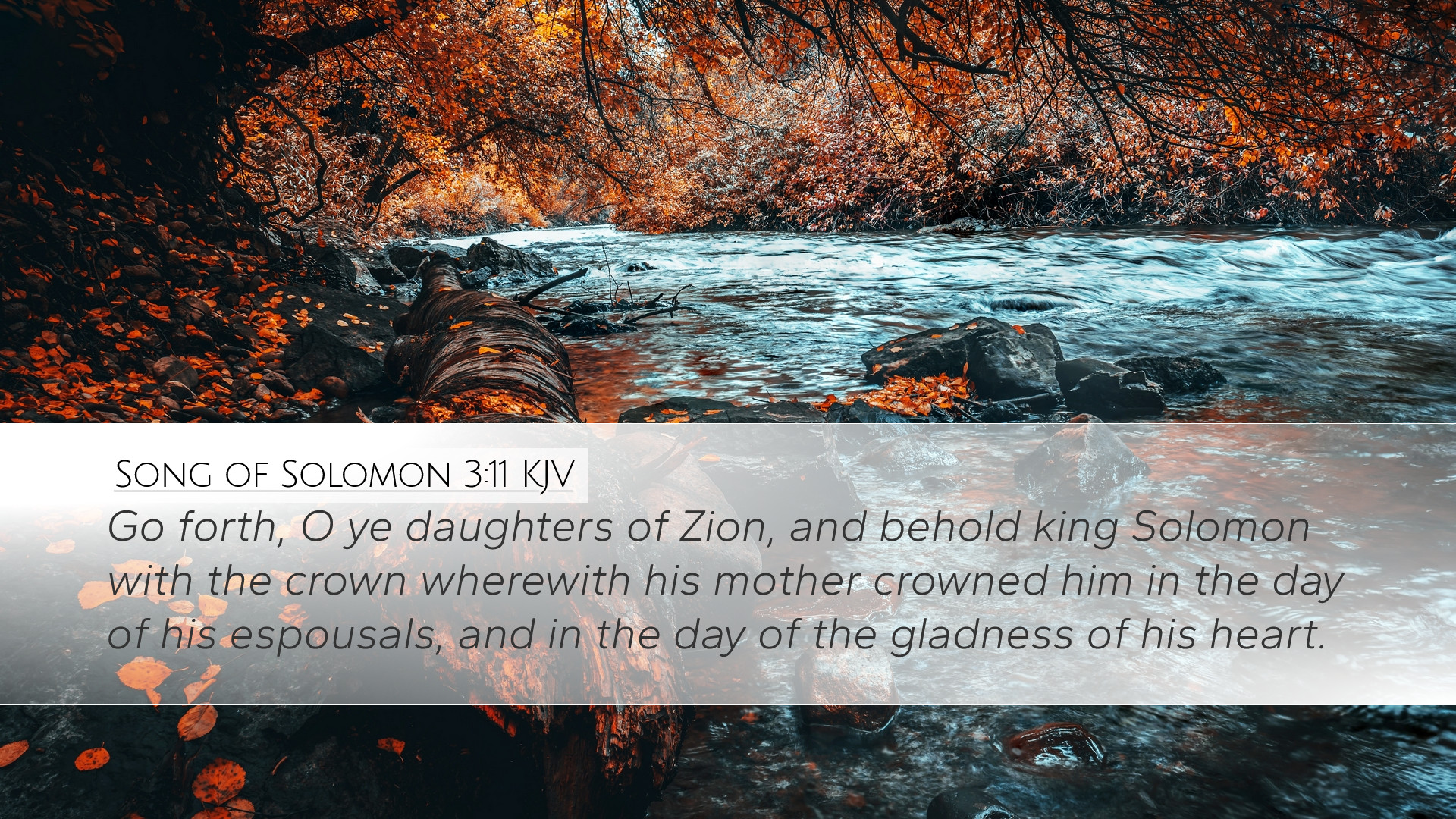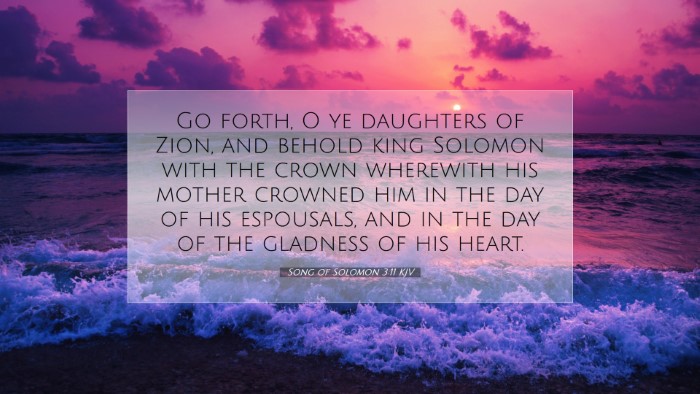Old Testament
Genesis Exodus Leviticus Numbers Deuteronomy Joshua Judges Ruth 1 Samuel 2 Samuel 1 Kings 2 Kings 1 Chronicles 2 Chronicles Ezra Nehemiah Esther Job Psalms Proverbs Ecclesiastes Song of Solomon Isaiah Jeremiah Lamentations Ezekiel Daniel Hosea Joel Amos Obadiah Jonah Micah Nahum Habakkuk Zephaniah Haggai Zechariah MalachiSong of Solomon 3:11
Song of Solomon 3:11 KJV
Go forth, O ye daughters of Zion, and behold king Solomon with the crown wherewith his mother crowned him in the day of his espousals, and in the day of the gladness of his heart.
Song of Solomon 3:11 Bible Commentary
Commentary on Song of Solomon 3:11
Verse: "Go forth, O ye daughters of Zion, and behold king Solomon, with the crown wherewith his mother crowned him in the day of his espousals, and in the day of the gladness of his heart."
Introduction
The Song of Solomon is a beautiful poetic book that often eludes definitive interpretation due to its rich imagery and metaphorical language. This particular verse (Song of Solomon 3:11) captures a moment of exaltation surrounding King Solomon, inviting the daughters of Zion to witness a moment of celebration. This commentary explores the depth of this passage, drawing from the insights of eminent biblical scholars such as Matthew Henry, Albert Barnes, and Adam Clarke.
The Historical Context
The Song of Solomon is traditionally attributed to Solomon, reflecting themes of love, beauty, and desire. In the context of ancient Israel, weddings and coronations were significant communal events filled with joy and festivity. Here, the crown signifies not only royalty but also the beloved's commitment, commemorating the special union reflected throughout the text.
Interpretation of Key Phrases
-
"Go forth, O ye daughters of Zion"
This invitation to the daughters of Zion resonates deeply, signifying a call to witness the beauty and glory of Solomon. Henry emphasizes that it serves as a summoning of God’s people to participate in divine celebration.
-
"Behold king Solomon"
Solomon represents not only a historical figure but also symbolizes wisdom, peace, and prosperity. Barnes notes that this reflects the ideal kingship that is both regal and benevolent, embodying the characteristics of divinely appointed leadership.
-
"With the crown wherewith his mother crowned him"
The mention of his mother's act of crowning Solomon indicates familial love and recognition of his rightful place as king. Clarke interprets this as an emblem of honor and the mother's role in his ascension, highlighting the collaborative nature of leadership.
-
"In the day of his espousals"
This phrase signifies not just a wedding but a covenantal relationship, symbolic of God's relationship with His people. It reflects the significance of marriage as a sacred bond, revealing the deeper spiritual truths embedded in human relationships.
-
"And in the day of the gladness of his heart"
This reflects joy, celebration, and fulfillment. According to Henry, it encapsulates the essence of love and the joy that comes from partnerships that are both sacred and celebratory.
Thematic Insights
The verse encapsulates several key themes that resonate throughout biblical literature:
-
The Importance of Community
Inviting the daughters of Zion to witness the celebration emphasizes the role of community in experiencing joy. Spiritual milestones are intended for communal acknowledgment and participation.
-
Covenantal Relationships
Symbolizing divine love, the espousal reflects God's covenant with Israel, portraying the depth of commitment expected in both human and divine relationships, as Clarke eloquently expresses.
-
The Joy of Dedicated Leadership
This passage also speaks to the joy of leadership that is grounded in service, stability, and faith. Barnes elucidates that Solomon’s kingship is marked by abundant blessings upon his people, amplifying the responsibilities leaders hold towards their followers.
Practical Applications
For today’s church and community leaders, this verse offers profound applications:
-
Encouraging Community Involvement
Recognize the importance of inviting members of the community to partake in significant spiritual moments, fostering a sense of belonging and shared joy.
-
Valuing Commitments and Relationships
The espousal speaks to the importance of commitment in both personal relationships and to God. Leaders can promote the significance of fidelity in all its forms.
-
Exemplifying Joyful Leadership
Church leaders are called to embody the joy of their service, reflecting the gladness that accompanies a relationship with God and others.
Conclusion
Song of Solomon 3:11 serves as an invitation to behold the magnificence of divine love as embodied in Solomon's reign. This verse not only paints an image of royal celebration but also provides a deeper understanding of the nature of relationships—both among humans and between humanity and God. It underscores the significance of community, the covenant, and the joy that transcends individual existence. By embracing the multi-faceted messages derived from this passage, pastors, students, and scholars alike are equipped to delve deeper into the artistry and theology of the Song of Solomon.


